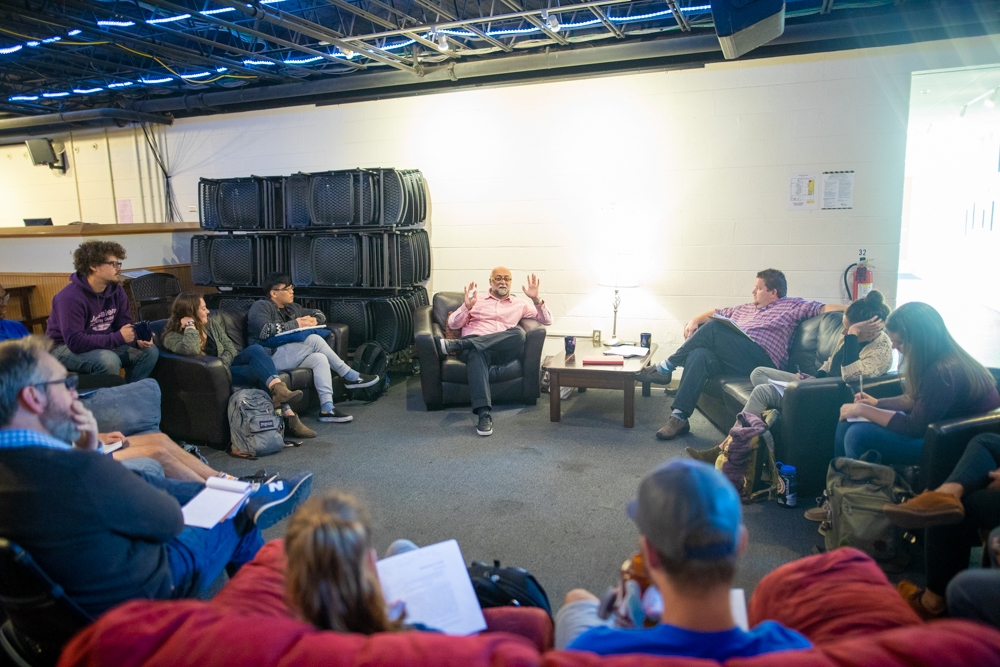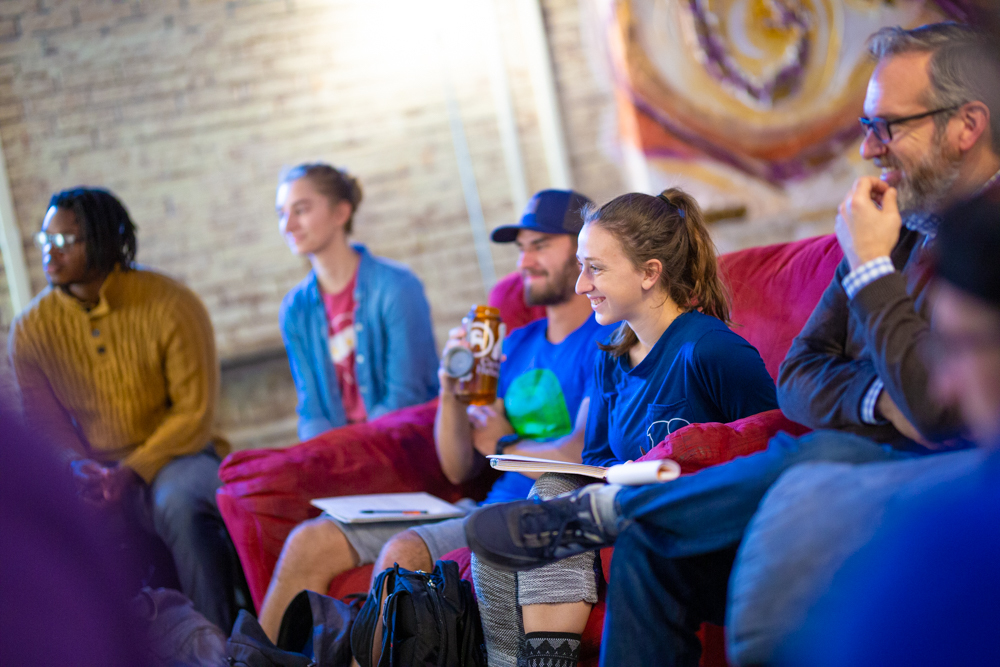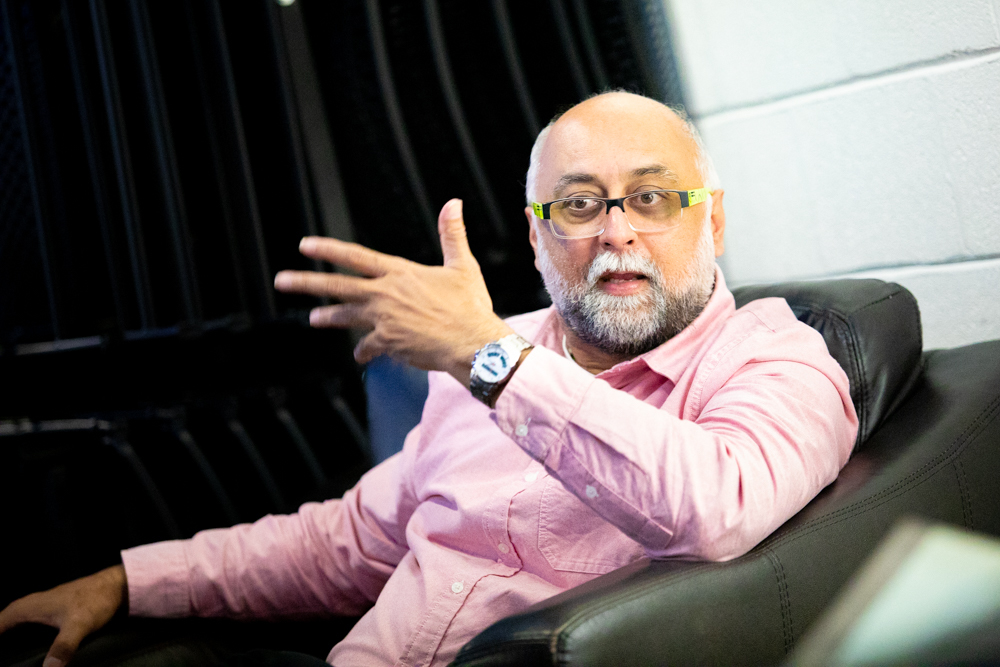“The greatest athlete that I ever saw was another American Muslim … I was nine years old in those less enlightened times, the 1970s, when Ali fought George Foreman in the ‘Rumble in the Jungle.’”
Thus began Dr. Amir Hussain’s lifelong admiration for the boxer and activist Muhammad Ali. Hussain, a professor of theological studies at Loyola Marymount University in Los Angeles, California, told this story as part of a colloquium at Eastern Mennonite University on Oct. 23. The talk was named after his latest book, Muslims and the Making of America (Baylor University Press, 2017).
Muslims and the Making of America is far from Hussain’s only work in the realm of popular culture. He serves as an adviser on The Story of God, a television documentary by Morgan Freeman, and was a consultant for the new Warner Bros. film, Blinded by the Light. EMU hosted two screenings of Blinded by the Light , including one talkback session with Professor Timothy Seidel, CIE’s director.
During his visit, Hussain spoke with students about Muslim representation in media over lunch, and visited classes on social and political economy, reimagining identity, and liberation theologies.

Muslim achievements shaped the U.S.
Ali is one of the dedicatees of Hussain’s Muslims and the Making of America.
Years after watching that historic fight on television, Hussain would learn more about the racial context of a country where not everyone shared his admiration for the African American boxer. He referenced an incident in which Ali was refused service in a restaurant in his hometown, after winning an Olympic gold medal in Rome in 1960.
“You can eat in the kitchen, but you’re the wrong color to sit in the dining room. Think about that as a young man. You’re good enough to win a gold medal for your country, but you’re the wrong color to eat in a restaurant.”
“You can eat in the kitchen” is a callback to the Langston Hughes poem, “I, too, sing America,” which Hussain recited at the beginning of his talk.
“They’ll see how beautiful I am / And be ashamed— / I, too, am America,” the poem ends.
“That’s what I want to do with this book,” Hussian explained. That is, to give the general reading public a narrative about the many Muslims whose achievements have helped shape our nation.
Hussain’s colloquium did that as well – serving up a historical digest of notable American Muslims, from the African slaves who first brought Islam to the U.S.; to Ahmet Ertegün, who founded Atlantic Records; to present-day congresswoman Ilhan Omar of Minnesota.
“There has never been an America without Muslims,” Hussain recited from the opening line of the book.

Hussain also spoke about the Islamophobia that emerged after Sept. 11, 2001. Before, Muslims had been “a curiosity,” that few of his students knew much about. After Sept. 11, his students claimed to know a lot about Muslims – but all negative stereotypes, and no history.
Connections to CIE, EMU
Trina Trotter Nussbaum, associate director of the Center for Interfaith Engagement at EMU, met Hussain at an American Academy of Religion conference in 2016.
“I was immediately taken by Amir’s ability to speak publicly about confronting Islamophobia while working across religious differences to build alliances, and I thought that we needed to hear from him here,” Nussbaum said. “Amir is both a skilled Muslim scholar and a plugged-in cultural critic and I really wanted the EMU community to be able to hear from him.”
Hussain’s roots in the Mennonite world run deep – he first collaborated with Mennonite Central Committee in 1988, on a trip to Israel-Palestine. His wife, Shannon Hamm, who passed away in 1992, grew up in a small Mennonite community in Manitoba, Canada.
President Susan Schultz Huxman, whose academic expertise lies in the field of rhetoric and communication, attended the colloquium.
“Dr. Hussain is a seasoned scholar and theologian and as a cultural studies and film studies expert,” said Huxman. “This combination makes his expertise a perfect supplement for our integrated liberal arts curriculum at EMU. More importantly, he is an expert communicator with engaging visuals who presents difficult and challenging topics in accessible and invitational forms.”
Hussain said after the colloquium that he was most excited about “the chance to engage with the students” while at EMU. In fact, those experiences are the reason why he’s in academia.
